Analyzing Ethical Issues: Healthcare, Euthanasia, ICT & Stem Cells
VerifiedAdded on 2023/06/08
|7
|1909
|290
Essay
AI Summary
This essay explores several critical ethical issues within the healthcare setting. It examines the complexities surrounding euthanasia, including the conflict between alleviating suffering and preserving life, as well as the violation of the Hippocratic oath. The discussion extends to the potential threats associated with implanting non-medical ICT (Information and Communication Technologies), highlighting concerns about privacy, security, and manipulation. Furthermore, the essay delves into the ethical debates surrounding human embryonic stem cell research, weighing the potential for groundbreaking medical advancements against the moral status and potential destruction of embryos. The arguments for and against each issue are presented, considering various perspectives, including deontological ethics, utilitarianism, and religious views.
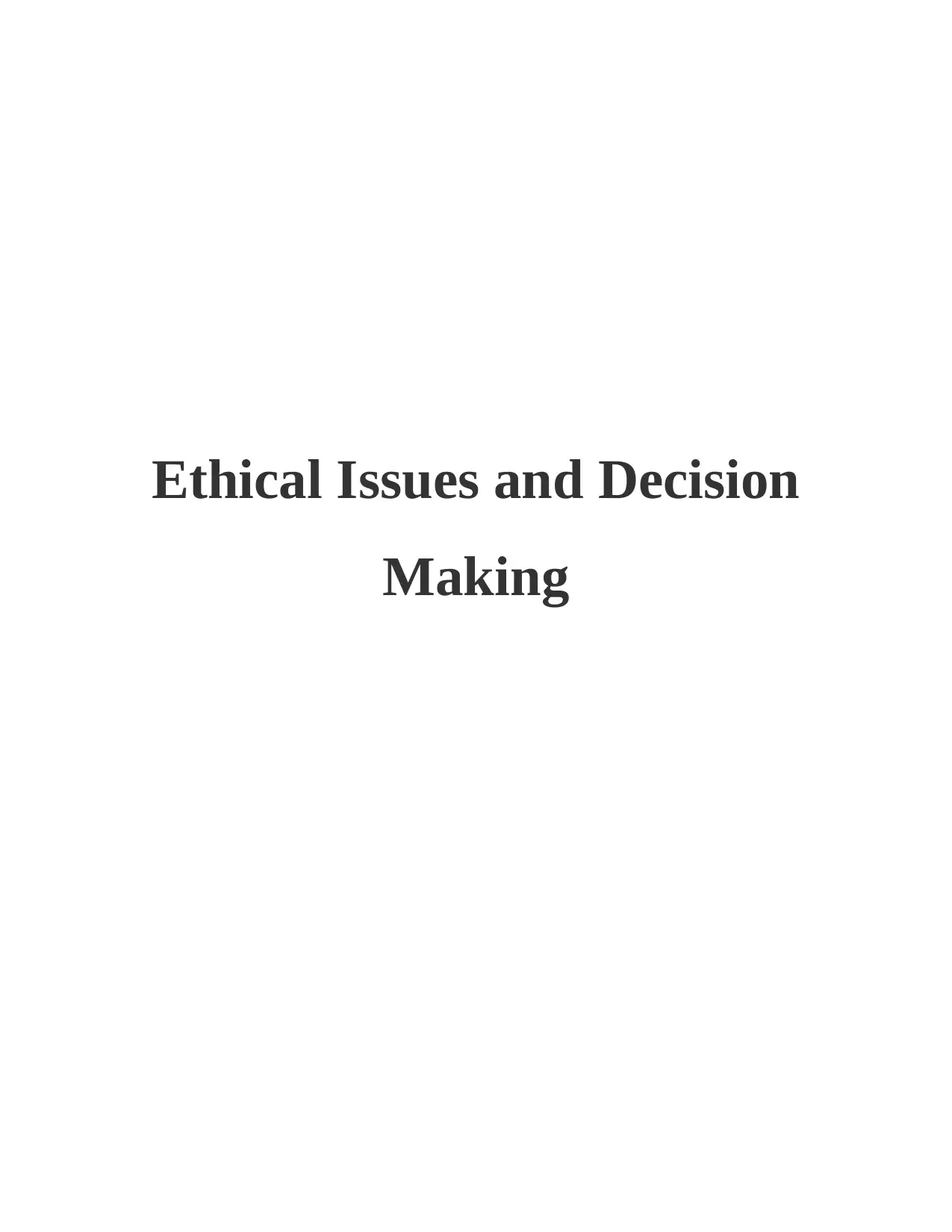
Ethical Issues and Decision
Making
Making
Paraphrase This Document
Need a fresh take? Get an instant paraphrase of this document with our AI Paraphraser
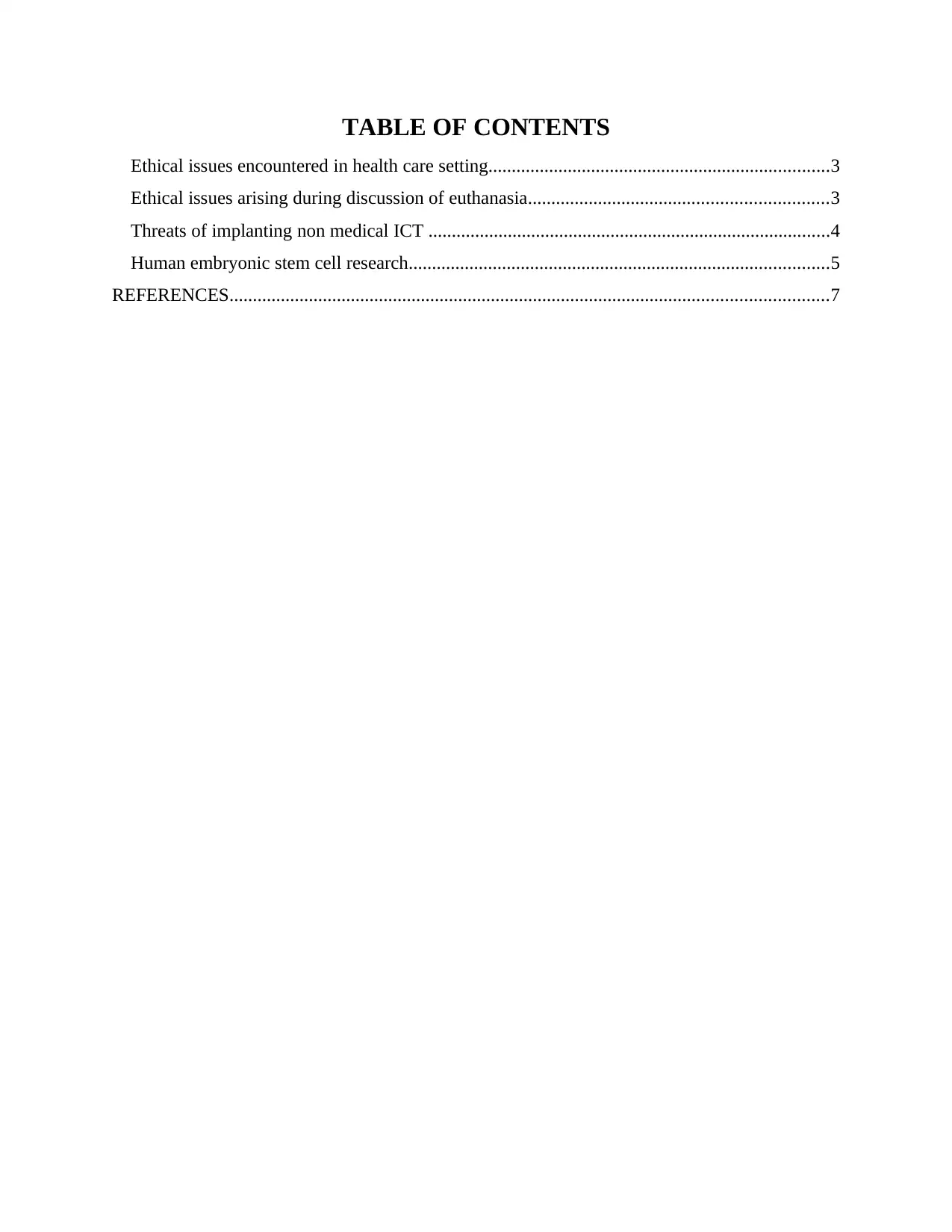
TABLE OF CONTENTS
Ethical issues encountered in health care setting.........................................................................3
Ethical issues arising during discussion of euthanasia................................................................3
Threats of implanting non medical ICT ......................................................................................4
Human embryonic stem cell research..........................................................................................5
REFERENCES................................................................................................................................7
Ethical issues encountered in health care setting.........................................................................3
Ethical issues arising during discussion of euthanasia................................................................3
Threats of implanting non medical ICT ......................................................................................4
Human embryonic stem cell research..........................................................................................5
REFERENCES................................................................................................................................7
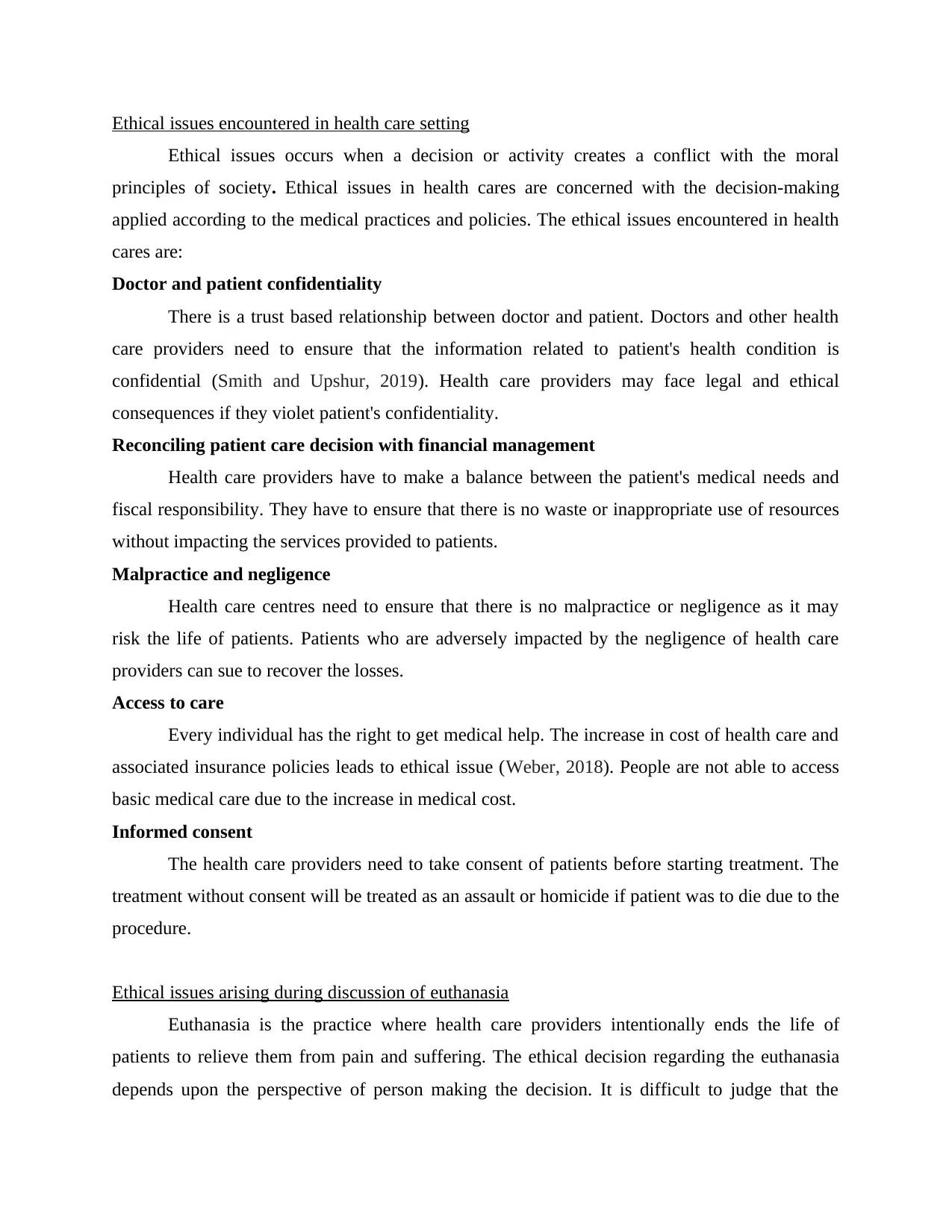
Ethical issues encountered in health care setting
Ethical issues occurs when a decision or activity creates a conflict with the moral
principles of society. Ethical issues in health cares are concerned with the decision-making
applied according to the medical practices and policies. The ethical issues encountered in health
cares are:
Doctor and patient confidentiality
There is a trust based relationship between doctor and patient. Doctors and other health
care providers need to ensure that the information related to patient's health condition is
confidential (Smith and Upshur, 2019). Health care providers may face legal and ethical
consequences if they violet patient's confidentiality.
Reconciling patient care decision with financial management
Health care providers have to make a balance between the patient's medical needs and
fiscal responsibility. They have to ensure that there is no waste or inappropriate use of resources
without impacting the services provided to patients.
Malpractice and negligence
Health care centres need to ensure that there is no malpractice or negligence as it may
risk the life of patients. Patients who are adversely impacted by the negligence of health care
providers can sue to recover the losses.
Access to care
Every individual has the right to get medical help. The increase in cost of health care and
associated insurance policies leads to ethical issue (Weber, 2018). People are not able to access
basic medical care due to the increase in medical cost.
Informed consent
The health care providers need to take consent of patients before starting treatment. The
treatment without consent will be treated as an assault or homicide if patient was to die due to the
procedure.
Ethical issues arising during discussion of euthanasia
Euthanasia is the practice where health care providers intentionally ends the life of
patients to relieve them from pain and suffering. The ethical decision regarding the euthanasia
depends upon the perspective of person making the decision. It is difficult to judge that the
Ethical issues occurs when a decision or activity creates a conflict with the moral
principles of society. Ethical issues in health cares are concerned with the decision-making
applied according to the medical practices and policies. The ethical issues encountered in health
cares are:
Doctor and patient confidentiality
There is a trust based relationship between doctor and patient. Doctors and other health
care providers need to ensure that the information related to patient's health condition is
confidential (Smith and Upshur, 2019). Health care providers may face legal and ethical
consequences if they violet patient's confidentiality.
Reconciling patient care decision with financial management
Health care providers have to make a balance between the patient's medical needs and
fiscal responsibility. They have to ensure that there is no waste or inappropriate use of resources
without impacting the services provided to patients.
Malpractice and negligence
Health care centres need to ensure that there is no malpractice or negligence as it may
risk the life of patients. Patients who are adversely impacted by the negligence of health care
providers can sue to recover the losses.
Access to care
Every individual has the right to get medical help. The increase in cost of health care and
associated insurance policies leads to ethical issue (Weber, 2018). People are not able to access
basic medical care due to the increase in medical cost.
Informed consent
The health care providers need to take consent of patients before starting treatment. The
treatment without consent will be treated as an assault or homicide if patient was to die due to the
procedure.
Ethical issues arising during discussion of euthanasia
Euthanasia is the practice where health care providers intentionally ends the life of
patients to relieve them from pain and suffering. The ethical decision regarding the euthanasia
depends upon the perspective of person making the decision. It is difficult to judge that the
⊘ This is a preview!⊘
Do you want full access?
Subscribe today to unlock all pages.

Trusted by 1+ million students worldwide
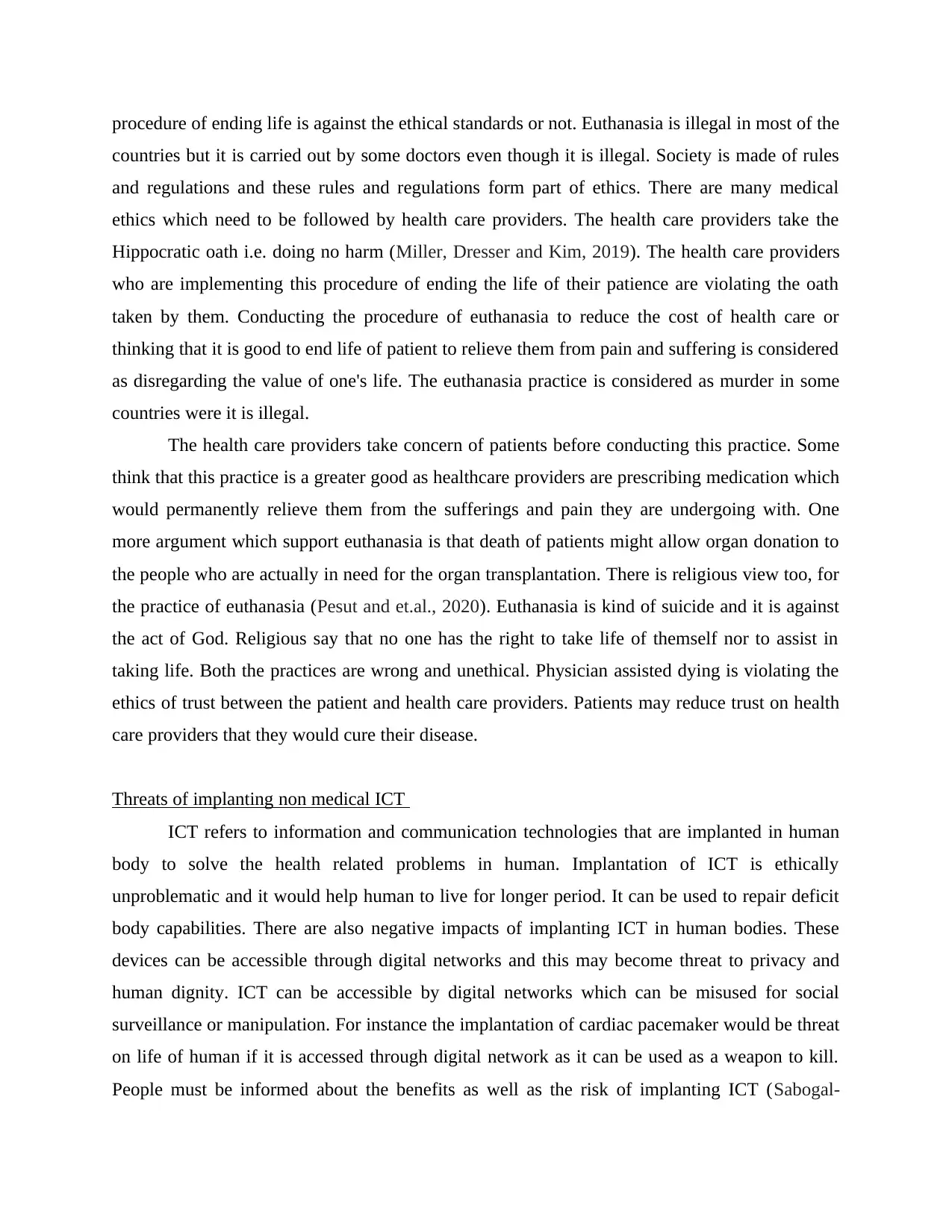
procedure of ending life is against the ethical standards or not. Euthanasia is illegal in most of the
countries but it is carried out by some doctors even though it is illegal. Society is made of rules
and regulations and these rules and regulations form part of ethics. There are many medical
ethics which need to be followed by health care providers. The health care providers take the
Hippocratic oath i.e. doing no harm (Miller, Dresser and Kim, 2019). The health care providers
who are implementing this procedure of ending the life of their patience are violating the oath
taken by them. Conducting the procedure of euthanasia to reduce the cost of health care or
thinking that it is good to end life of patient to relieve them from pain and suffering is considered
as disregarding the value of one's life. The euthanasia practice is considered as murder in some
countries were it is illegal.
The health care providers take concern of patients before conducting this practice. Some
think that this practice is a greater good as healthcare providers are prescribing medication which
would permanently relieve them from the sufferings and pain they are undergoing with. One
more argument which support euthanasia is that death of patients might allow organ donation to
the people who are actually in need for the organ transplantation. There is religious view too, for
the practice of euthanasia (Pesut and et.al., 2020). Euthanasia is kind of suicide and it is against
the act of God. Religious say that no one has the right to take life of themself nor to assist in
taking life. Both the practices are wrong and unethical. Physician assisted dying is violating the
ethics of trust between the patient and health care providers. Patients may reduce trust on health
care providers that they would cure their disease.
Threats of implanting non medical ICT
ICT refers to information and communication technologies that are implanted in human
body to solve the health related problems in human. Implantation of ICT is ethically
unproblematic and it would help human to live for longer period. It can be used to repair deficit
body capabilities. There are also negative impacts of implanting ICT in human bodies. These
devices can be accessible through digital networks and this may become threat to privacy and
human dignity. ICT can be accessible by digital networks which can be misused for social
surveillance or manipulation. For instance the implantation of cardiac pacemaker would be threat
on life of human if it is accessed through digital network as it can be used as a weapon to kill.
People must be informed about the benefits as well as the risk of implanting ICT (Sabogal-
countries but it is carried out by some doctors even though it is illegal. Society is made of rules
and regulations and these rules and regulations form part of ethics. There are many medical
ethics which need to be followed by health care providers. The health care providers take the
Hippocratic oath i.e. doing no harm (Miller, Dresser and Kim, 2019). The health care providers
who are implementing this procedure of ending the life of their patience are violating the oath
taken by them. Conducting the procedure of euthanasia to reduce the cost of health care or
thinking that it is good to end life of patient to relieve them from pain and suffering is considered
as disregarding the value of one's life. The euthanasia practice is considered as murder in some
countries were it is illegal.
The health care providers take concern of patients before conducting this practice. Some
think that this practice is a greater good as healthcare providers are prescribing medication which
would permanently relieve them from the sufferings and pain they are undergoing with. One
more argument which support euthanasia is that death of patients might allow organ donation to
the people who are actually in need for the organ transplantation. There is religious view too, for
the practice of euthanasia (Pesut and et.al., 2020). Euthanasia is kind of suicide and it is against
the act of God. Religious say that no one has the right to take life of themself nor to assist in
taking life. Both the practices are wrong and unethical. Physician assisted dying is violating the
ethics of trust between the patient and health care providers. Patients may reduce trust on health
care providers that they would cure their disease.
Threats of implanting non medical ICT
ICT refers to information and communication technologies that are implanted in human
body to solve the health related problems in human. Implantation of ICT is ethically
unproblematic and it would help human to live for longer period. It can be used to repair deficit
body capabilities. There are also negative impacts of implanting ICT in human bodies. These
devices can be accessible through digital networks and this may become threat to privacy and
human dignity. ICT can be accessible by digital networks which can be misused for social
surveillance or manipulation. For instance the implantation of cardiac pacemaker would be threat
on life of human if it is accessed through digital network as it can be used as a weapon to kill.
People must be informed about the benefits as well as the risk of implanting ICT (Sabogal-
Paraphrase This Document
Need a fresh take? Get an instant paraphrase of this document with our AI Paraphraser
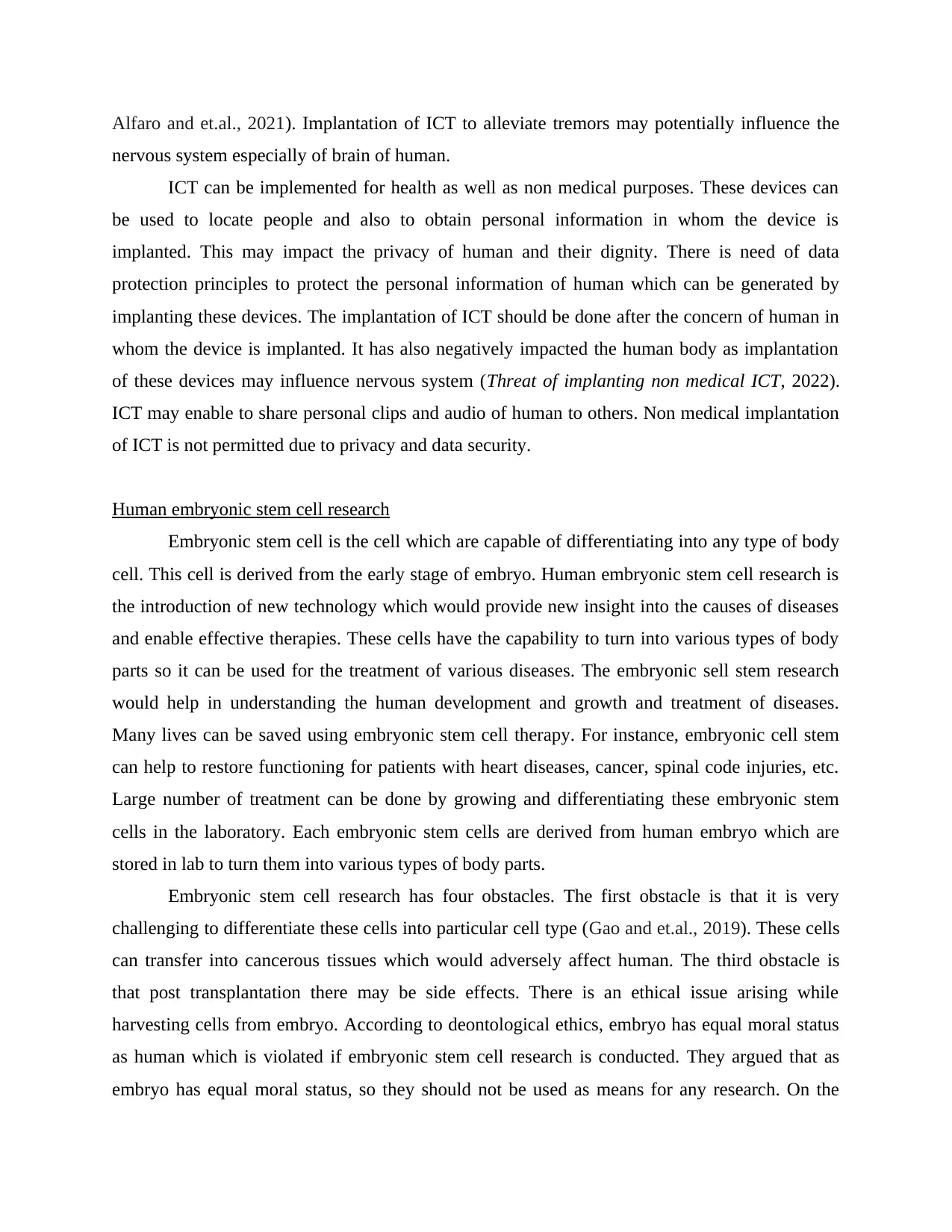
Alfaro and et.al., 2021). Implantation of ICT to alleviate tremors may potentially influence the
nervous system especially of brain of human.
ICT can be implemented for health as well as non medical purposes. These devices can
be used to locate people and also to obtain personal information in whom the device is
implanted. This may impact the privacy of human and their dignity. There is need of data
protection principles to protect the personal information of human which can be generated by
implanting these devices. The implantation of ICT should be done after the concern of human in
whom the device is implanted. It has also negatively impacted the human body as implantation
of these devices may influence nervous system (Threat of implanting non medical ICT, 2022).
ICT may enable to share personal clips and audio of human to others. Non medical implantation
of ICT is not permitted due to privacy and data security.
Human embryonic stem cell research
Embryonic stem cell is the cell which are capable of differentiating into any type of body
cell. This cell is derived from the early stage of embryo. Human embryonic stem cell research is
the introduction of new technology which would provide new insight into the causes of diseases
and enable effective therapies. These cells have the capability to turn into various types of body
parts so it can be used for the treatment of various diseases. The embryonic sell stem research
would help in understanding the human development and growth and treatment of diseases.
Many lives can be saved using embryonic stem cell therapy. For instance, embryonic cell stem
can help to restore functioning for patients with heart diseases, cancer, spinal code injuries, etc.
Large number of treatment can be done by growing and differentiating these embryonic stem
cells in the laboratory. Each embryonic stem cells are derived from human embryo which are
stored in lab to turn them into various types of body parts.
Embryonic stem cell research has four obstacles. The first obstacle is that it is very
challenging to differentiate these cells into particular cell type (Gao and et.al., 2019). These cells
can transfer into cancerous tissues which would adversely affect human. The third obstacle is
that post transplantation there may be side effects. There is an ethical issue arising while
harvesting cells from embryo. According to deontological ethics, embryo has equal moral status
as human which is violated if embryonic stem cell research is conducted. They argued that as
embryo has equal moral status, so they should not be used as means for any research. On the
nervous system especially of brain of human.
ICT can be implemented for health as well as non medical purposes. These devices can
be used to locate people and also to obtain personal information in whom the device is
implanted. This may impact the privacy of human and their dignity. There is need of data
protection principles to protect the personal information of human which can be generated by
implanting these devices. The implantation of ICT should be done after the concern of human in
whom the device is implanted. It has also negatively impacted the human body as implantation
of these devices may influence nervous system (Threat of implanting non medical ICT, 2022).
ICT may enable to share personal clips and audio of human to others. Non medical implantation
of ICT is not permitted due to privacy and data security.
Human embryonic stem cell research
Embryonic stem cell is the cell which are capable of differentiating into any type of body
cell. This cell is derived from the early stage of embryo. Human embryonic stem cell research is
the introduction of new technology which would provide new insight into the causes of diseases
and enable effective therapies. These cells have the capability to turn into various types of body
parts so it can be used for the treatment of various diseases. The embryonic sell stem research
would help in understanding the human development and growth and treatment of diseases.
Many lives can be saved using embryonic stem cell therapy. For instance, embryonic cell stem
can help to restore functioning for patients with heart diseases, cancer, spinal code injuries, etc.
Large number of treatment can be done by growing and differentiating these embryonic stem
cells in the laboratory. Each embryonic stem cells are derived from human embryo which are
stored in lab to turn them into various types of body parts.
Embryonic stem cell research has four obstacles. The first obstacle is that it is very
challenging to differentiate these cells into particular cell type (Gao and et.al., 2019). These cells
can transfer into cancerous tissues which would adversely affect human. The third obstacle is
that post transplantation there may be side effects. There is an ethical issue arising while
harvesting cells from embryo. According to deontological ethics, embryo has equal moral status
as human which is violated if embryonic stem cell research is conducted. They argued that as
embryo has equal moral status, so they should not be used as means for any research. On the
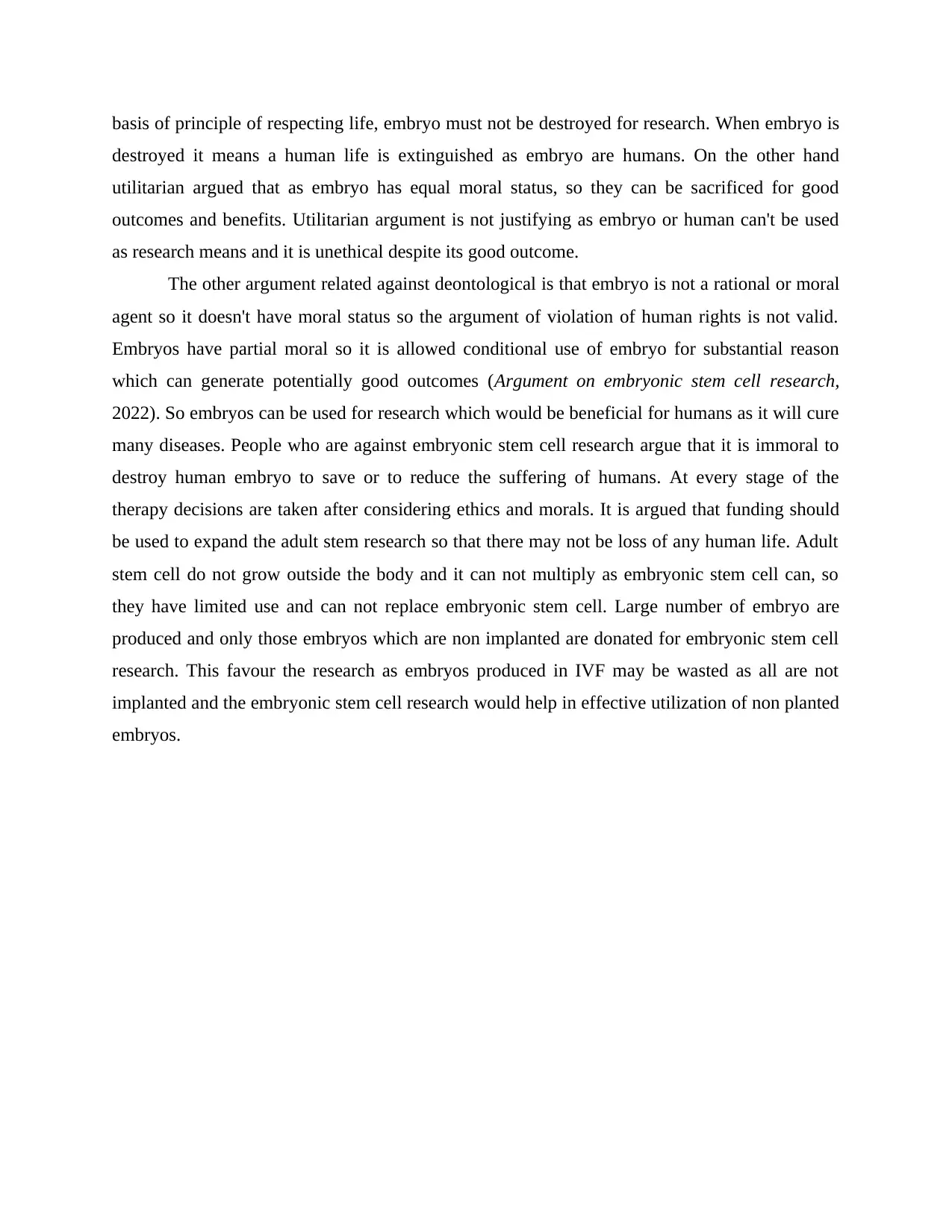
basis of principle of respecting life, embryo must not be destroyed for research. When embryo is
destroyed it means a human life is extinguished as embryo are humans. On the other hand
utilitarian argued that as embryo has equal moral status, so they can be sacrificed for good
outcomes and benefits. Utilitarian argument is not justifying as embryo or human can't be used
as research means and it is unethical despite its good outcome.
The other argument related against deontological is that embryo is not a rational or moral
agent so it doesn't have moral status so the argument of violation of human rights is not valid.
Embryos have partial moral so it is allowed conditional use of embryo for substantial reason
which can generate potentially good outcomes (Argument on embryonic stem cell research,
2022). So embryos can be used for research which would be beneficial for humans as it will cure
many diseases. People who are against embryonic stem cell research argue that it is immoral to
destroy human embryo to save or to reduce the suffering of humans. At every stage of the
therapy decisions are taken after considering ethics and morals. It is argued that funding should
be used to expand the adult stem research so that there may not be loss of any human life. Adult
stem cell do not grow outside the body and it can not multiply as embryonic stem cell can, so
they have limited use and can not replace embryonic stem cell. Large number of embryo are
produced and only those embryos which are non implanted are donated for embryonic stem cell
research. This favour the research as embryos produced in IVF may be wasted as all are not
implanted and the embryonic stem cell research would help in effective utilization of non planted
embryos.
destroyed it means a human life is extinguished as embryo are humans. On the other hand
utilitarian argued that as embryo has equal moral status, so they can be sacrificed for good
outcomes and benefits. Utilitarian argument is not justifying as embryo or human can't be used
as research means and it is unethical despite its good outcome.
The other argument related against deontological is that embryo is not a rational or moral
agent so it doesn't have moral status so the argument of violation of human rights is not valid.
Embryos have partial moral so it is allowed conditional use of embryo for substantial reason
which can generate potentially good outcomes (Argument on embryonic stem cell research,
2022). So embryos can be used for research which would be beneficial for humans as it will cure
many diseases. People who are against embryonic stem cell research argue that it is immoral to
destroy human embryo to save or to reduce the suffering of humans. At every stage of the
therapy decisions are taken after considering ethics and morals. It is argued that funding should
be used to expand the adult stem research so that there may not be loss of any human life. Adult
stem cell do not grow outside the body and it can not multiply as embryonic stem cell can, so
they have limited use and can not replace embryonic stem cell. Large number of embryo are
produced and only those embryos which are non implanted are donated for embryonic stem cell
research. This favour the research as embryos produced in IVF may be wasted as all are not
implanted and the embryonic stem cell research would help in effective utilization of non planted
embryos.
⊘ This is a preview!⊘
Do you want full access?
Subscribe today to unlock all pages.

Trusted by 1+ million students worldwide
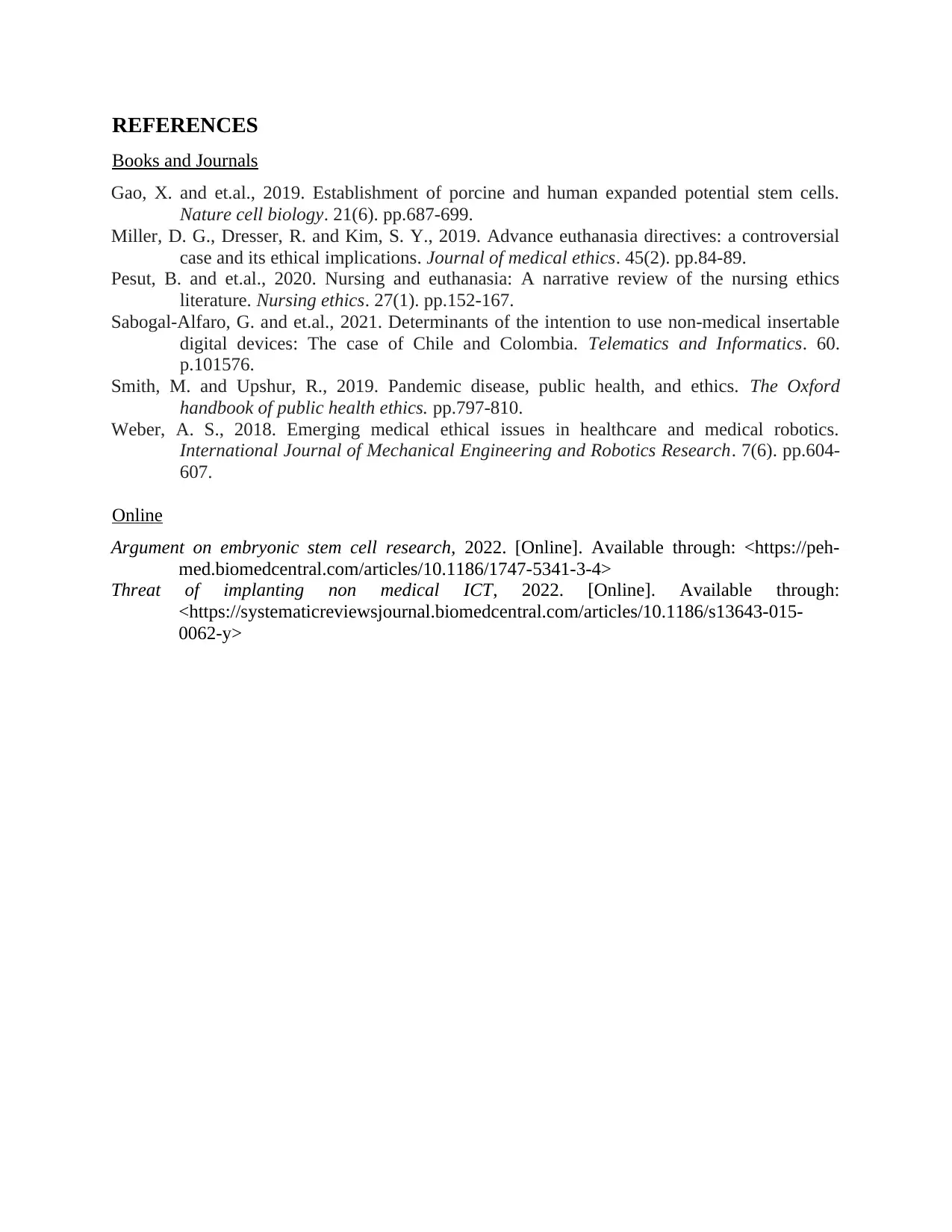
REFERENCES
Books and Journals
Gao, X. and et.al., 2019. Establishment of porcine and human expanded potential stem cells.
Nature cell biology. 21(6). pp.687-699.
Miller, D. G., Dresser, R. and Kim, S. Y., 2019. Advance euthanasia directives: a controversial
case and its ethical implications. Journal of medical ethics. 45(2). pp.84-89.
Pesut, B. and et.al., 2020. Nursing and euthanasia: A narrative review of the nursing ethics
literature. Nursing ethics. 27(1). pp.152-167.
Sabogal-Alfaro, G. and et.al., 2021. Determinants of the intention to use non-medical insertable
digital devices: The case of Chile and Colombia. Telematics and Informatics. 60.
p.101576.
Smith, M. and Upshur, R., 2019. Pandemic disease, public health, and ethics. The Oxford
handbook of public health ethics. pp.797-810.
Weber, A. S., 2018. Emerging medical ethical issues in healthcare and medical robotics.
International Journal of Mechanical Engineering and Robotics Research. 7(6). pp.604-
607.
Online
Argument on embryonic stem cell research, 2022. [Online]. Available through: <https://peh-
med.biomedcentral.com/articles/10.1186/1747-5341-3-4>
Threat of implanting non medical ICT, 2022. [Online]. Available through:
<https://systematicreviewsjournal.biomedcentral.com/articles/10.1186/s13643-015-
0062-y>
Books and Journals
Gao, X. and et.al., 2019. Establishment of porcine and human expanded potential stem cells.
Nature cell biology. 21(6). pp.687-699.
Miller, D. G., Dresser, R. and Kim, S. Y., 2019. Advance euthanasia directives: a controversial
case and its ethical implications. Journal of medical ethics. 45(2). pp.84-89.
Pesut, B. and et.al., 2020. Nursing and euthanasia: A narrative review of the nursing ethics
literature. Nursing ethics. 27(1). pp.152-167.
Sabogal-Alfaro, G. and et.al., 2021. Determinants of the intention to use non-medical insertable
digital devices: The case of Chile and Colombia. Telematics and Informatics. 60.
p.101576.
Smith, M. and Upshur, R., 2019. Pandemic disease, public health, and ethics. The Oxford
handbook of public health ethics. pp.797-810.
Weber, A. S., 2018. Emerging medical ethical issues in healthcare and medical robotics.
International Journal of Mechanical Engineering and Robotics Research. 7(6). pp.604-
607.
Online
Argument on embryonic stem cell research, 2022. [Online]. Available through: <https://peh-
med.biomedcentral.com/articles/10.1186/1747-5341-3-4>
Threat of implanting non medical ICT, 2022. [Online]. Available through:
<https://systematicreviewsjournal.biomedcentral.com/articles/10.1186/s13643-015-
0062-y>
1 out of 7
Related Documents
Your All-in-One AI-Powered Toolkit for Academic Success.
+13062052269
info@desklib.com
Available 24*7 on WhatsApp / Email
![[object Object]](/_next/static/media/star-bottom.7253800d.svg)
Unlock your academic potential
Copyright © 2020–2025 A2Z Services. All Rights Reserved. Developed and managed by ZUCOL.





